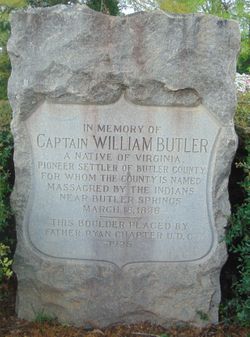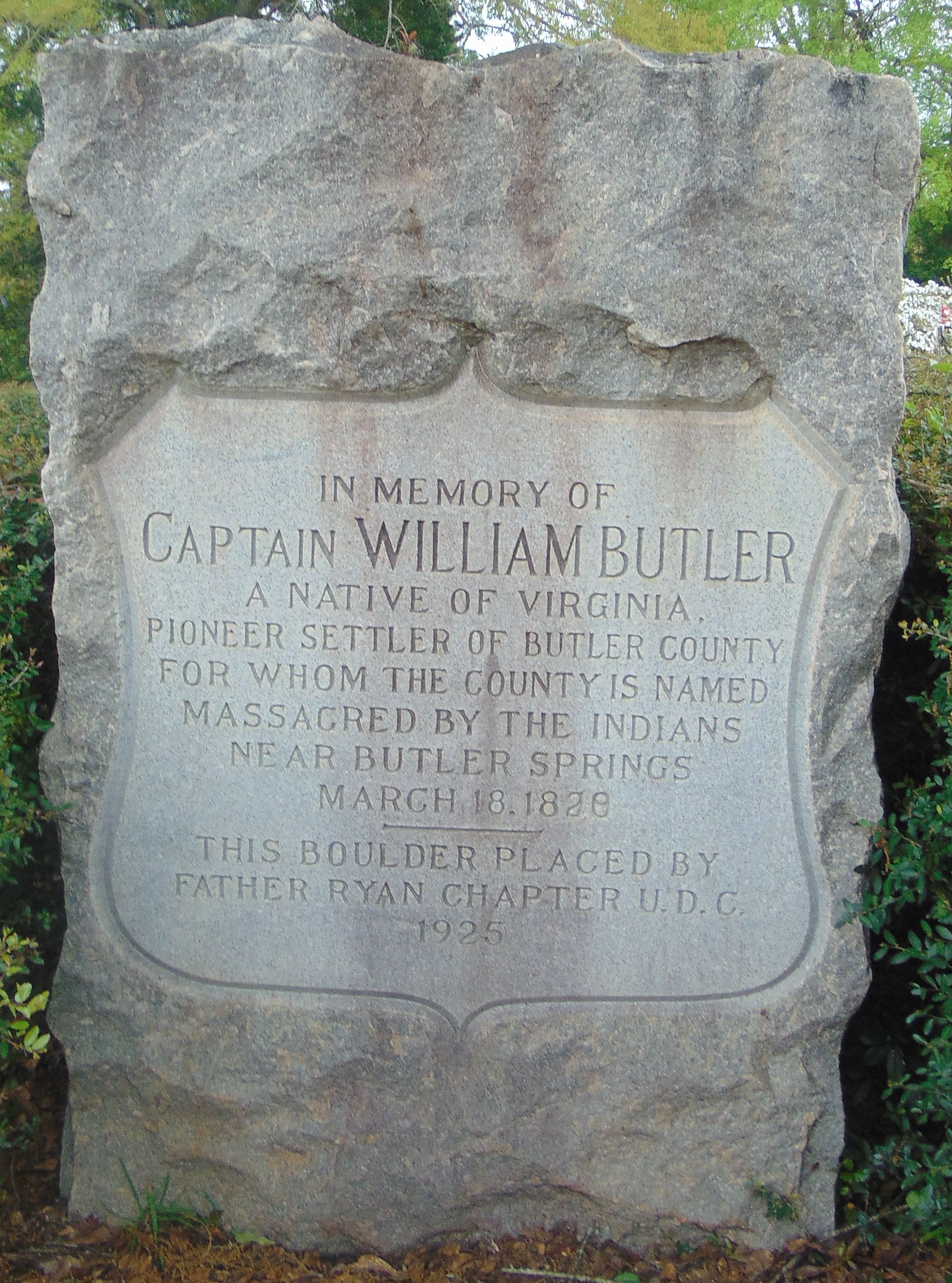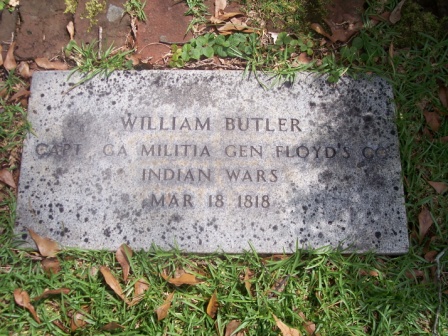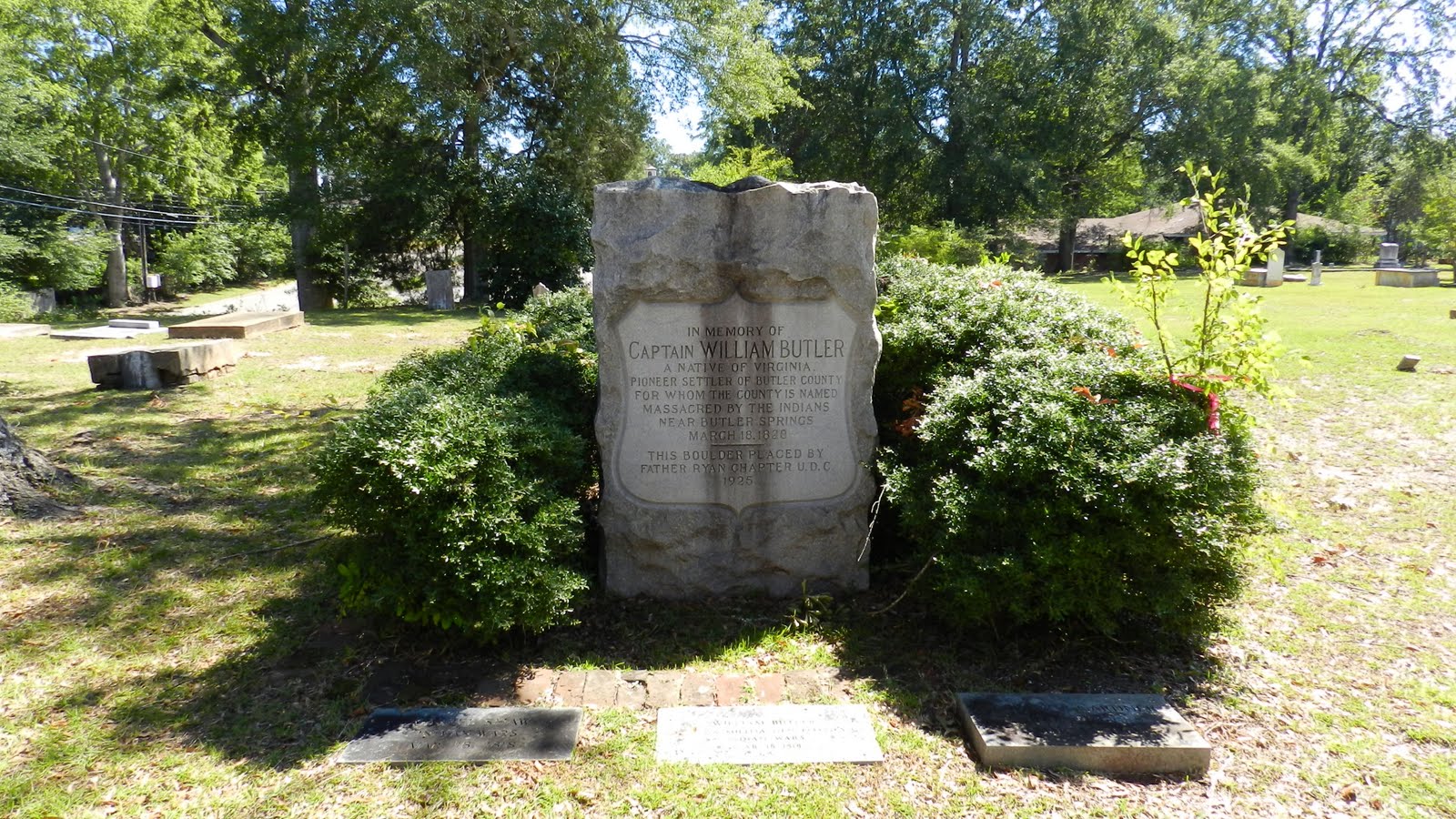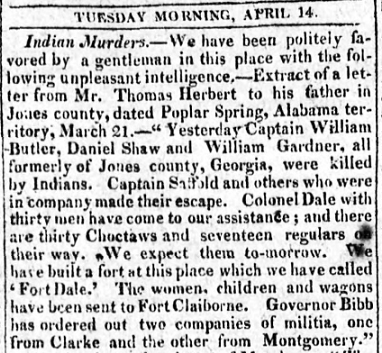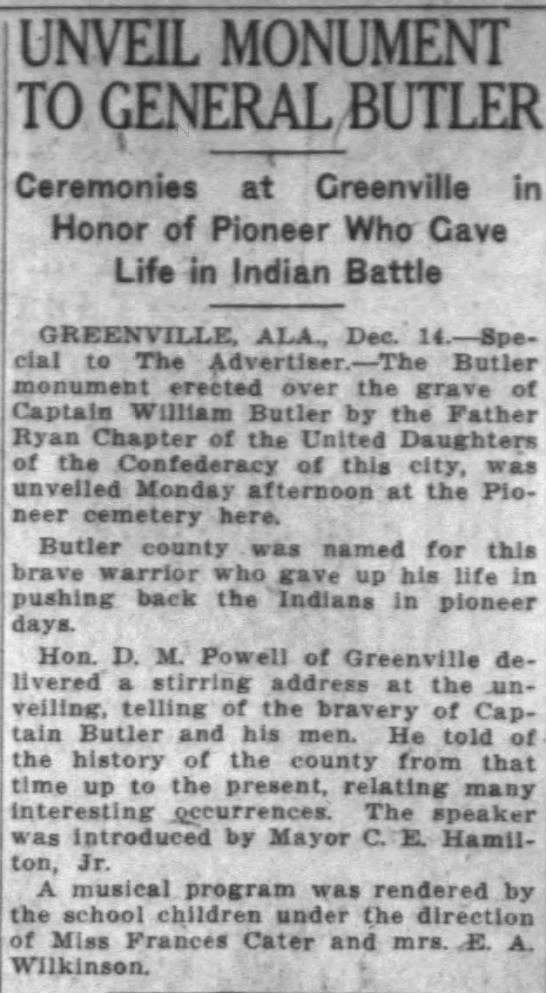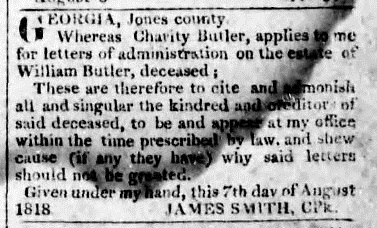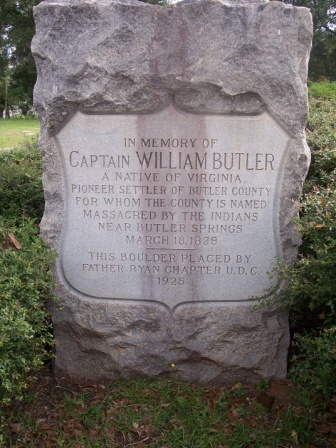He served as a Georgia State Senator in 1810 and again in 1814, when he was living in Jones County.
He died between Fort Bibb and Fort Dale in Butler County, Alabama when he was massacred by Indians near Butler Springs as he carried a message between the two Forts.
===========================
NOTE: Burial listing has the death date as March 20, 1818.
The date on the marker is March 18; and one has 1828 corrected to 1818.
From the book, The History of Butler County, Alabama, 1815 to 1885, by John Buckner Little c.1885.
CHAPTER II. Earliest History.—Formation of the County from Conecuh and Monroe—Named in Honor of Captain William Butler—First Settlements by the Whites—Description of the County at That Time.
This county was formed from Conecuh and Monroe by an act passed December 13, 1819, by the Legislature while in session at Huntsville. This was the first session of the Legislature of Alabama as a State. The House was composed of forty-five members with James Dellet of Monroe as Speaker; the Senate of twenty-one members and Thomas Bibb was President. William W. Bibb was inaugurated first Governor of the State on the 9th of November 1819 before Congress had yet admitted Alabama into the Union as a State. The name of Fairfield was first proposed for this county, but was changed on the passage of the bill to Butler in honor of Captain William Butler. This brave captain was a native of Virginia and was of a restless and ambitious nature. He lived in the State of Georgia for a few years and was, while there, a member of her Legislature and was also connected with the militia of the State. He soon came to the Territory of Alabama to satisfy his adventurous character, but did not remain here long before he was killed in a horrible manner by the Indians near Butler Springs on the morning of the 20th of March, 1818. While on his way from Fort Bibb, in the Flat, to Fort Dale in company with four other men, Captain Butler was wounded and thrown from his horse, —but attempted to make his escape. Seeing that this was impossible, he resolved to die fighting the enemy. By his pluck and skill, he succeeded in killing one of Savannah Jack's bravest warriors and severely wounding several others who attacked him, but the unfortunate soldier was finally overcome by the numerical strength of the bloodthirsty savages who not only took his life, but who left his mangled body in the open forest after having beaten him almost to a jelly with ramrods, scalped him, and cut off his ears and privates, and stuffed them into his mouth. He was found in this condition the next day. Captain Butler was exploring the new country previous to the Ogly massacre and had taken refuge in Fort Bibb until the Indians should be driven away. He volunteered his service to go along with any person to carry some important message to Fort Dale which was situated in another part of the county about fifteen miles distant. Unfortunately, his daring courage caused him to lose his noble life before he had scarcely time to make it useful to his fellow-men. His remains, along with those of Daniel Shaw and William P. Gardner, were buried the next day by a detachment of men sent by Colonel Samuel Dale for that purpose; and the dense forest where these young heroes were killed was their burial-ground; and the mild wailing of the wind as it quietly whistled through the branches of the towering pines was their only mourner for many years.
In the year 1858 or thereabout, after a rest of over forty winters undisturbed, the decayed remains of these adventurous patriots were removed to the city of Greenville and buried in the old cemetery. A large concourse of citizens were in attendance when the remains were quietly deposited in their final resting place, and not a single gun was fired in memory of their heroic lives.
Joseph Dunklin took an active part in having the bodies removed and he deserves to be highly commended for the noble and patriotic motives which prompted him to be so conspicuous in such a good work. The pall-bearers on the occasion were Joseph Dunklin, Judge Samuel J. Bolling, Ezekiel Pickens and Joseph M. Farmer—four of the oldest residents of Greenville. Hilary A. Herbert who is now one among Alabama's most distinguished statesmen delivered a beautiful and patriotic address, which was filled with praise of the sacred names of our first fallen braves. After the delivery of the address, resolutions were offered and unanimously adopted by those present to raise money for the purpose of erecting a suitable monument over the graves of these dead heroes. Unfortunately, the war between the States soon followed and the requisite amount of money was never raised for purchasing the marble shaft for marking the spot of Captain Butler's last resting place and showing to the world that his name still lived, although he himself was dead.
Previous to the war, however, Hon. Benjamin F. Porter removed to Greenville with his interesting family. His kind and cultured wife sought the graves of the buried heroes and immediately took steps to have a tomb erected to mark the sacred spot. Existing circumstances prevented her from receiving any encouragement from the people and she was forced to give up all hopes of their assistance in the matter. In 1861, greatly to the honor and memory of her illustrious name, Mrs. Porter purchased a small slab of marble at her own expense and had it placed over the grave of the noble William Butler.
It is to be earnestly hoped that the good people of our county will, in the near future, take active steps for having a lofty shaft raised in some conspicuous place in Greenville in memory of the man whose name Butler County now so proudly bears.
(Thanks to Diane Gravlee for her research and for sharing this; RWicks).
He served as a Georgia State Senator in 1810 and again in 1814, when he was living in Jones County.
He died between Fort Bibb and Fort Dale in Butler County, Alabama when he was massacred by Indians near Butler Springs as he carried a message between the two Forts.
===========================
NOTE: Burial listing has the death date as March 20, 1818.
The date on the marker is March 18; and one has 1828 corrected to 1818.
From the book, The History of Butler County, Alabama, 1815 to 1885, by John Buckner Little c.1885.
CHAPTER II. Earliest History.—Formation of the County from Conecuh and Monroe—Named in Honor of Captain William Butler—First Settlements by the Whites—Description of the County at That Time.
This county was formed from Conecuh and Monroe by an act passed December 13, 1819, by the Legislature while in session at Huntsville. This was the first session of the Legislature of Alabama as a State. The House was composed of forty-five members with James Dellet of Monroe as Speaker; the Senate of twenty-one members and Thomas Bibb was President. William W. Bibb was inaugurated first Governor of the State on the 9th of November 1819 before Congress had yet admitted Alabama into the Union as a State. The name of Fairfield was first proposed for this county, but was changed on the passage of the bill to Butler in honor of Captain William Butler. This brave captain was a native of Virginia and was of a restless and ambitious nature. He lived in the State of Georgia for a few years and was, while there, a member of her Legislature and was also connected with the militia of the State. He soon came to the Territory of Alabama to satisfy his adventurous character, but did not remain here long before he was killed in a horrible manner by the Indians near Butler Springs on the morning of the 20th of March, 1818. While on his way from Fort Bibb, in the Flat, to Fort Dale in company with four other men, Captain Butler was wounded and thrown from his horse, —but attempted to make his escape. Seeing that this was impossible, he resolved to die fighting the enemy. By his pluck and skill, he succeeded in killing one of Savannah Jack's bravest warriors and severely wounding several others who attacked him, but the unfortunate soldier was finally overcome by the numerical strength of the bloodthirsty savages who not only took his life, but who left his mangled body in the open forest after having beaten him almost to a jelly with ramrods, scalped him, and cut off his ears and privates, and stuffed them into his mouth. He was found in this condition the next day. Captain Butler was exploring the new country previous to the Ogly massacre and had taken refuge in Fort Bibb until the Indians should be driven away. He volunteered his service to go along with any person to carry some important message to Fort Dale which was situated in another part of the county about fifteen miles distant. Unfortunately, his daring courage caused him to lose his noble life before he had scarcely time to make it useful to his fellow-men. His remains, along with those of Daniel Shaw and William P. Gardner, were buried the next day by a detachment of men sent by Colonel Samuel Dale for that purpose; and the dense forest where these young heroes were killed was their burial-ground; and the mild wailing of the wind as it quietly whistled through the branches of the towering pines was their only mourner for many years.
In the year 1858 or thereabout, after a rest of over forty winters undisturbed, the decayed remains of these adventurous patriots were removed to the city of Greenville and buried in the old cemetery. A large concourse of citizens were in attendance when the remains were quietly deposited in their final resting place, and not a single gun was fired in memory of their heroic lives.
Joseph Dunklin took an active part in having the bodies removed and he deserves to be highly commended for the noble and patriotic motives which prompted him to be so conspicuous in such a good work. The pall-bearers on the occasion were Joseph Dunklin, Judge Samuel J. Bolling, Ezekiel Pickens and Joseph M. Farmer—four of the oldest residents of Greenville. Hilary A. Herbert who is now one among Alabama's most distinguished statesmen delivered a beautiful and patriotic address, which was filled with praise of the sacred names of our first fallen braves. After the delivery of the address, resolutions were offered and unanimously adopted by those present to raise money for the purpose of erecting a suitable monument over the graves of these dead heroes. Unfortunately, the war between the States soon followed and the requisite amount of money was never raised for purchasing the marble shaft for marking the spot of Captain Butler's last resting place and showing to the world that his name still lived, although he himself was dead.
Previous to the war, however, Hon. Benjamin F. Porter removed to Greenville with his interesting family. His kind and cultured wife sought the graves of the buried heroes and immediately took steps to have a tomb erected to mark the sacred spot. Existing circumstances prevented her from receiving any encouragement from the people and she was forced to give up all hopes of their assistance in the matter. In 1861, greatly to the honor and memory of her illustrious name, Mrs. Porter purchased a small slab of marble at her own expense and had it placed over the grave of the noble William Butler.
It is to be earnestly hoped that the good people of our county will, in the near future, take active steps for having a lofty shaft raised in some conspicuous place in Greenville in memory of the man whose name Butler County now so proudly bears.
(Thanks to Diane Gravlee for her research and for sharing this; RWicks).
Inscription
WILLIAM BUTLER
CAPT GA MILITIA GEN FLOYD'S CO
INDIAN WARS
MARCH 18, 1818
Family Members
Advertisement
Records on Ancestry
Sponsored by Ancestry
Advertisement
